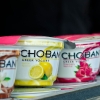Whole Foods to Chobani: Please Leave

Is it possible to get too successful for Whole Foods? The grocery chain’s latest move to stop shelving the Greek yogurt brand begs the question.
Here we’ve got one outstanding entrepreneur selling his product to a public company run by another crazily successful entrepreneur. Both entrepreneurs care about healthy food, and they’re both supporting another large community of entrepreneurs–dairy farmers. And it looks like it’s going to be quite a mess.
According to a story in the Wall Street Journal, Whole Foods Market, still run by co-founder and co-CEO John Mackie, has said it will no longer be selling Chobani yogurt as of 2014. Chobani is owned and operated by Hamdi Ulukaya, a Turkish immigrant and entrepreneur who is credited with turning struggling areas of upstate New York into a veritable yogurt Nirvana.
Whole Foods says it is dropping Chobani because it wants to make room on its shelves for products from smaller producers that either do not contain genetically-modified organisms or that clearly label ingredients that are genetically-modified. While Chobani markets its yogurt as “Nothing but good,” there have been complaints that some of the farmers who sell milk to Chobani give their cows genetically-modified feed.
In the past, when asked why Chobani yogurt isn’t non-GMO or organic, Ulukaya has generally demurred on two counts: price and community. It’s important to him, he has said, that Chobani remain accessible to a mass audience, which he says makes organic ingredients too costly. And he says he’s loyal to the farmers who helped him build his business, and doesn’t want to either meddle in their livelihoods or cut them off.
Whole Foods also said it wants to be able to carry more niche yogurts and those exclusive to Whole Foods, implying that it will leave the door open to the small local producers it has often championed. For now, Whole Foods is still carrying Fage, another Greek-style yogurt that is not GMO-free and also not labeled as such. But Fage doesn’t have nearly the distribution that Chobani does.
While Chobani was in Shop-Rite before it was in Whole Foods, for some food makers, getting a nod from Whole Foods has been a huge step toward mainstream acceptance. Whole Foods’ decision seems to imply that small independent producers are still welcome, but those who achieve some level of market saturation –and no longer contribute to Whole Foods’ air of artisinally-produced goodness–may be asked to leave.
Meanwhile, Whole Foods’ own strategy on GMO foods is becoming more clear. The company enraged activists when it refused to support the California Genetically Engineered Food Labeling Act of 2012. The failed bill would have mandated that any GMO foods sold in California be labeled as such. Because California is such a big state, the law would have meant, for practical purposes, that all GMOs, nationwide, were labeled.
If all companies had to label GMOs, Whole Foods’ insistence that its vendors do so wouldn’t seem like such a big deal. Now, in the absence of a labeling law, Whole Foods is trying to create a market–and a competitive advantage–by requiring just such labeling in its own stores.
![]()






Leave a Reply